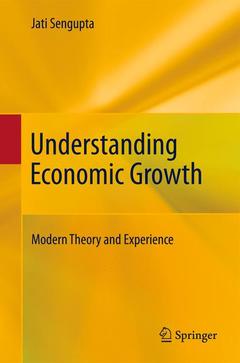Description
Understanding Economic Growth, 2011
Modern Theory and Experience
Author: Sengupta Jati
Language: English
Subjects for Understanding Economic Growth:
Approximative price 52.74 €
In Print (Delivery period: 15 days).
Add to cartPublication date: 10-2014
120 p. · 15.5x23.5 cm · Paperback
Approximative price 52.74 €
In Print (Delivery period: 15 days).
Add to cartPublication date: 01-2011
120 p. · 15.5x23.5 cm · Hardback
Description
/li>Contents
/li>Comment
/li>
Modern economies have undergone a dramatic change. There has been a shift from large scale material manufacturing to the design and application of new technology with R&D and human capital. The new information age has introduced significant productivity gains through increasing returns and learning by doing, which has challenged the traditional growth models based on competitive market structures. Institutions outside the traditional markets and the genetic principle of survival of the fittest have dominated the current theory of industry growth.
This book coordinates and integrates the two strands of economic growth and development: the endogenous theory of growth and the extra-market models of evolutionary economics dominated by innovation efficiency. It presents this new paradigm in terms of both theory and historical experiences. The book addresses the role of innovations and human capital, the impact of information technology, the role of institutions as mechanisms of evolutionary economies and the experiences of Asian growth miracles, and will be of interest to readers in economics and political science concerned with economic growth and development.
Integrates the micro theory of industry growth with macro theory
Emphasizes the impact of the recent upsurge of information technology and the role of non-market institutions
Analyzes the growth of international markets and high-tech industries, especially in Asia, with reference to knowledge creation and diffusion
Includes supplementary material: sn.pub/extras




